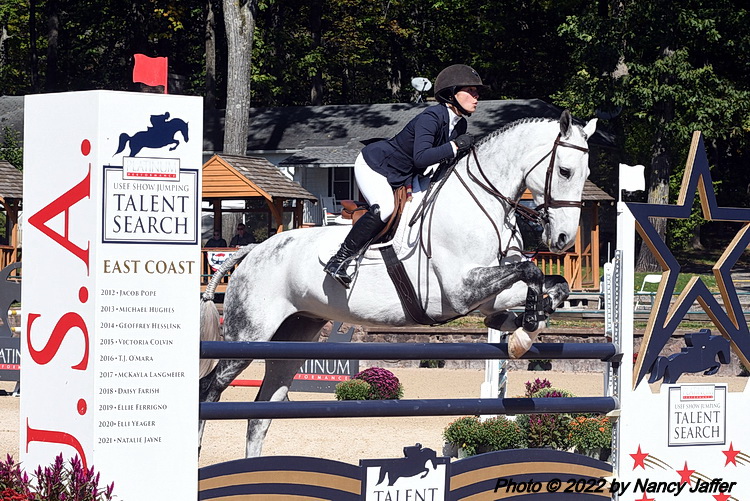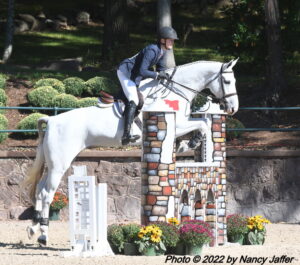From the start there were challenges–then the tests became increasingly difficult this weekend at the Platinum Performance/USEF Show Jumping Talent Search Finals East.
And that’s how it should be. After all, with competition running over three days, the Talent Search is the most arduous of the equitation championships, geared to finding riders who could compete internationally for their country.
So it shouldn’t have been a shock that athletes were expected to ride solo through nine different movements on the flat, complete a gymnastics competition offering a challenge in its very first line and then face a jumping course incorporating elements of the World Championships and the American Gold Cup.
The Talent Search East ended today (the West Coast version was last week) with a come-from-behind winner, Augusta Iwasaki, who was tied for 16th place after Friday’s very demanding flat phase, leaped up to third after the gymnastics and insured a spot in the Final Four with her stunning round this morning on her jumper, Freedom.
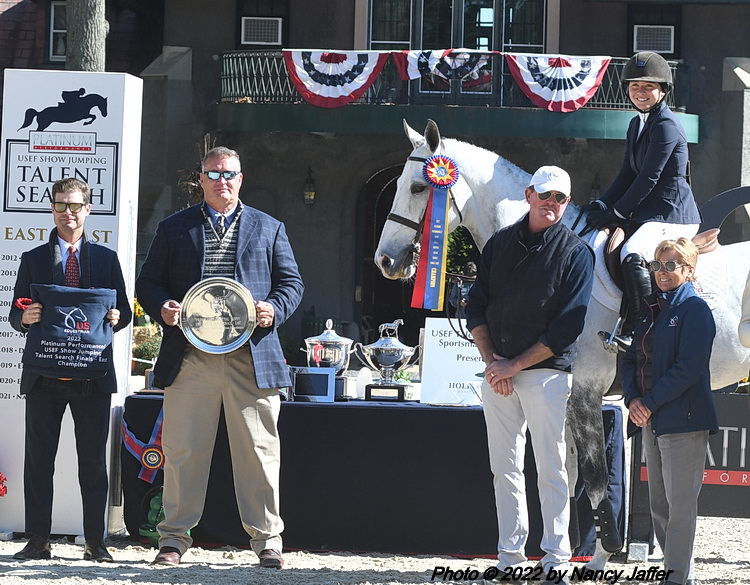
Augusta Iwasaki on Freedom getting her trophy in the Platinum Performance/USEF Talent Search East from judges Michael Morrissey and Alex Jayne, with trainer Ken Smith on hand next to DiAnn Langer, USEF youth coach. (Photo © 2022 by Nancy Jaffer)
The Californian, who is on the riding team at Southern Methodist University, did not take a wrong stride on her own horse or those of her three rivals to earn the title at the U.S. Equestrian Team Foundation in Gladstone, N.J.
“I knew if we got to the Final Four she had a shot at winning,” said her trainer, Ken Smith.
“She’s super-experienced at riding a lot of different horses and has a natural feel and empathy for a horse to just get on it and create a nice round. She’s very good at not giving up.”
Gussie, whose parents, Liz Reilley and Chris Iwasaki, are also trainers, showed what she’s made of by achieving her victory.
“She reassured me she can handle pressure situations,” said Ken, after I asked if he had learned anything more about her this weekend.
“She’s probably the most liked young rider on the showgrounds. She’s friendly, very admired by her peers, super work ethic. She’s going to go far in life.”
Freedom had never been used for equitation.
“He took me from the lows (low jumpers) to my first grand prix. He’s one of my favorite horses of all time. This is my first time here,” she said, explaining how much she liked competing on the historic foundation grounds.
“It’s so prestigious,” added the California native, who was third, 19 points behind Alexander, before the Final Four, but finished that segment on 377, 13 points ahead of runner-up Luke Jensen.
Alex Jayne, who judged the Talent Search with jumper rider Michael Morrissey, has long watched Gussie handling “thousands and thousands” of catch rides.
“She has ridden everything under the sun,” he said, adding he told Michael “I think Gussie might have an advantage over these other riders.”
He characterized her as “a very gifted rider. So if somebody had a pony that was a little bit of a rogue, they put Gussie on it. If somebody’s junior hunter wasn’t going great, they put Gussie on it. Any time the gate opens, I could see Gussie going to the ring. You can’t beat ring time. This rider is living proof.”
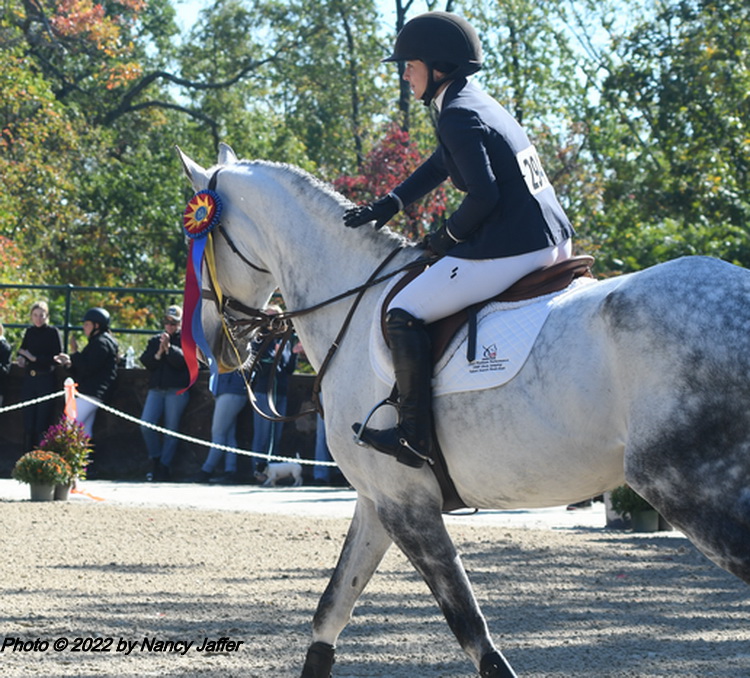
Augusta Iwasaki gets ready to take off on her victory gallop aboard Freedom. (Photo © 2022 by Nancy Jaffer)
The flat phase was an eye-opener for some of the 53 entries, who may have compared it to a dressage test. But Alex characterized it simply as “jumper movements strung together. and we were trying to see how well they were preparing the horse to do the gymnastics.”
The nine movements riders had to demonstrate included a turn on the haunches, holding the bend for the counter-canter and leg yields. An additional mark was given for presentation. Alex explained that by having each rider perform solo, rather than in a group, there was nowhere to hide mistakes.
“As judges and (course) designers, we tried to make every day prepare you for the next day. So the flat phase prepared you for the gymnastics phase and the gymnastics phase prepared you for what we called the grand prix day,” said Michael, who worked with Alex and Anthony D’Ambrosio on the courses.
The first line of the gymnastics required riders to canter the initial fence, a green, purple and white oxer, then trot the second and go on to canter the vertical double, 3A and 3B. Not everyone got that far. The judges were surprised at the refusals and problems some riders had at the trot fence. I called it lack of impulsion, Alex characterized the situation a little differently.
“Show jumping is all compression,” he said, citing the problem on that line as “a lack of compression. The leg wasn’t on the horse.”
He said he and Michael were surprised at how many riders had trouble there. Michael said in some instances, the riders weren’t getting the trot early enough before the second fence.
Alexander Alston won that phase and took the gymnastics as well, and then continued to lead after the jumping. But the Ohioan, who will attend Savannah College of Art and Design next year, had problems on Gussie’s horse in the Final Four, getting tight to two fences which would eventually drop him to fourth place. His score for that segment was 337; all the riders came in with a blank slate, the scores with which they qualified were only used to determine who got into the Final Four.

Alex Alston on Ferry van de Hoogeweg against the backdrop of the USET Foundation stable. (Photo © 2022 by Nancy Jaffer}
When I wondered how he felt about leading for so long, and then losing the title, he conceded. “it was tough,” but added, “trust the process.”
As for what he learned from this weekend, he said, “I could be a little stronger riding different types of horses, I think.”
Luke, a Texan trained by Missy Clark and John Brennan with Maggie Gampfer, the trio that also coaches Alexander, won the third phase and was standing second overall by one point aboard Jamaica going into the Final Four. But he dropped rails at fence four, an oxer, on Freedom, and then toppled 7A, an oxer after the triple bar, on Alexander’s Ferry van den Hoogeweg. He wound up as reserve champion anyway, with a score of 364.
“This is always a super special week showing here. I think the time to show off your ability to change your ride in the Final Four is a skill to demonstrate,” he said.
“The other three riders did an amazing job with that, too. It’s always a great experience to test that ability…to ride different horses.”
Judge Alex noted while the male riders had mistakes, both were stylists.
Another SMU student, Taylor Madden, coached by her parents, Jen and Frank Madden, was second after the flat phase and fifth after the gymnastics, but moved up to fourth following the show jumping round and finished third after the Final Four on a score of 358.
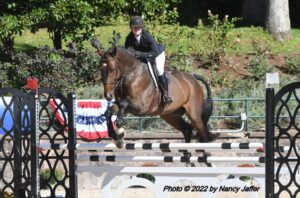
Her mount, Mac One, was named Best Horse of the finals. Riding him in the Talent Search was special to her because he had been her horse as a junior and is now leased out, so she appreciated being able to compete on him one more time.
Judge Alex said the weekend showed, “We had a very strong group.” He noted, “the future is very bright for the USA with these young riders coming up.”
Results: Rider, horse, horse owner, trainer, hometown.
| 1 | Augusta Iwasaki | Freedom | Ali Nilforushan | Chris Iwasaki | Calabasas | CA |
| 2 | Luke Jensen | Jamaica | NORTH RUN | John Brennan | Denton | TX |
| 3 | Taylor Madden | Mac One III | TAYLOR MADDEN | Frank Madden | Wellington | FL |
| 4 | Alexander Alston | Ferry Van Den Hoogeweg | PLAIN BAY SALES | John Brennan | New Albany | OH |
| 5 | Isabella David | Castlefield Spartacus | WEST HILL | Stacia Madden | Holmdel | NJ |
| 6 | Avery Glynn | Itteville | JET SHOW STABLE | John Brennan | Petaluma | CA |
| 7 | Kate Hagerty | Noche De Ronda | THE HAGERTY FAMILY | Valerie Renihan | Terrebonne | OR |
| 8 | Zayna Rizvi | Acer K | NORTH RUN | John Brennan | Wellington | FL |
| 9 | Carlee McCutcheon | HHS Hercules | ABIGAIL WEXNER | Max Amaya | Aubrey | TX |
| 10 | Eve Westfall | Artillero | AMELIA RIEGEL | Stacia Madden | Boulder | CO |

